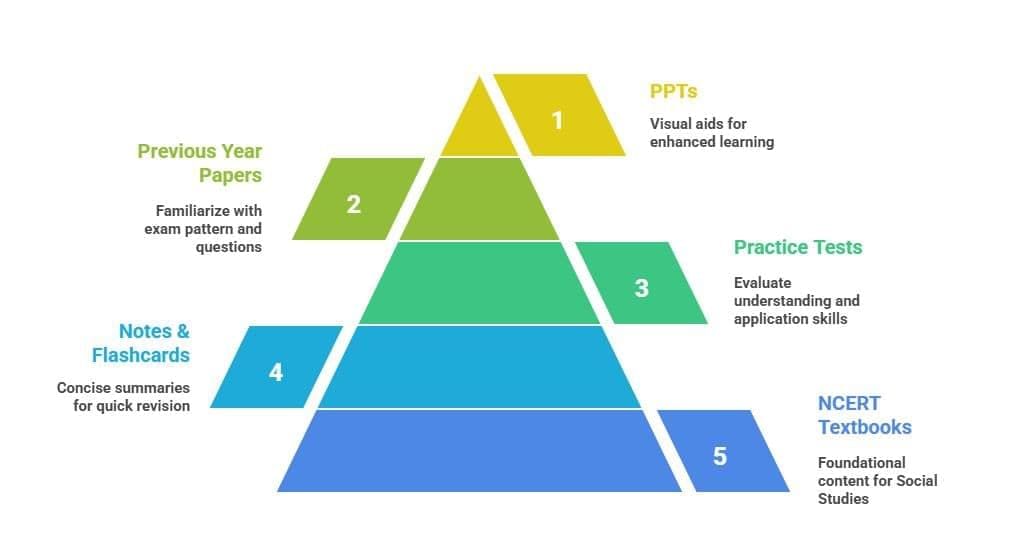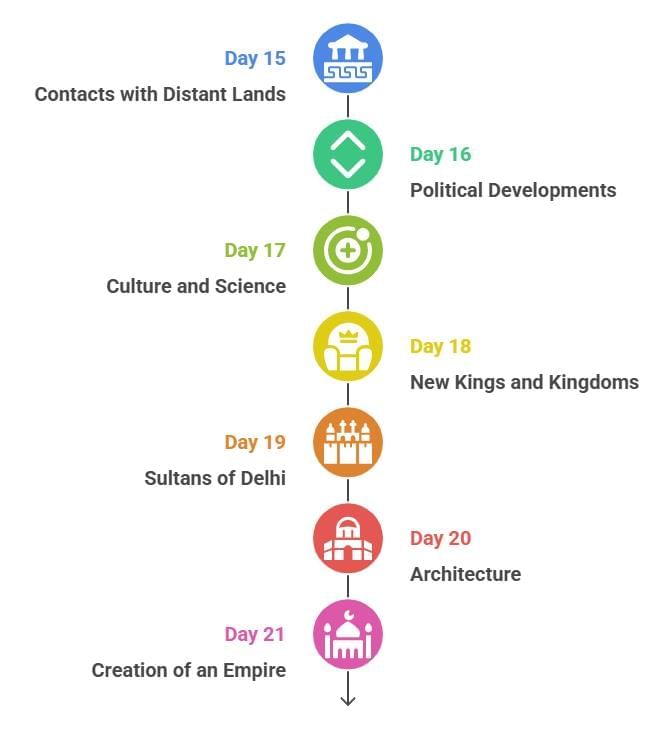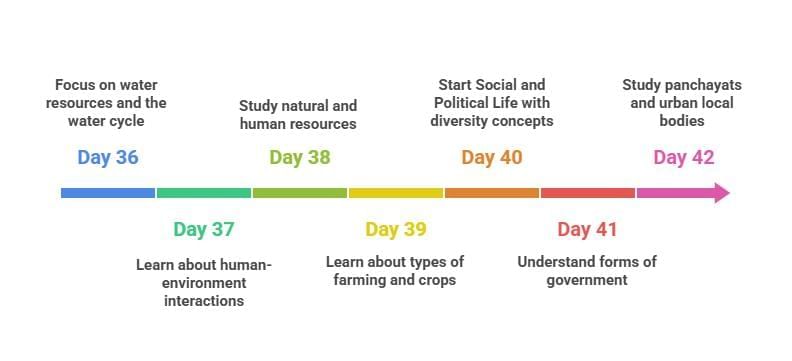60-Day Study Plan: Social Studies & Pedagogy Paper 2 for CTET | Social Studies & Pedagogy Paper 2 for CTET & TET Exams - CTET & State TET PDF Download
Introduction
This 60-day study plan is designed to prepare you for the Social Studies & Pedagogy section of CTET Paper 2 (Classes VI-VIII). It covers key areas including History, Geography, Social and Political Life, and Pedagogy. The plan incorporates NCERT textbooks, notes, practice tests, PPTs, flashcards, and previous year papers to build a strong foundation in content and teaching strategies. Each day focuses on specific topics, practice, and revision to ensure thorough preparation. Follow this beginner-friendly plan to excel in the CTET exam.
Study Plan
Week 1: History - Ancient Period (Days 1-7)
Focus on early history, timelines, and ancient civilizations.
Day 1: When, Where and How
Learn about historical timelines and sources.
- Read: Notes: When, Where & How
- Watch: Video: When, Where and How
- Practice: Test: When, Where and How - 1
Day 2: When, Where and How (Continued)
Reinforce with visuals and additional practice.
- Study: PPT: When, Where and How
- Revise: Flashcards: When, Where and How
- Practice: Test: When, Where and How - 2
Day 3: The Earliest Societies
Study early human societies and lifestyles.
- Read: Notes: The Earliest Societies
- Watch: Video: The Earliest Societies
- Practice: Test: The Earliest Societies
Day 4: The Earliest Societies (Continued)
Review with mind maps and test knowledge.
- Study: PPT: The Earliest Societies
- Revise: Mind Map: The Earliest Societies
- Practice: Test: Earliest Societies
Day 5: The First Farmers and Herders
Explore the shift to farming and herding.
Day 6: The First Farmers and Herders (Continued)
Use visuals and flashcards for quick recall.
Day 7: The First Cities
Learn about early urban civilizations like the Indus Valley.
- Read: Notes: The First Cities
- Watch: Video: The First Cities
- Practice: Test: The First Cities
Week 2: History - Early States and Ideas (Days 8-14)
Cover early kingdoms, empires, and philosophical ideas.
Day 8: The First Cities (Continued)
Review with cheat sheets and practice.
- Study: PPT: The First Cities
- Revise: Cheat Sheet: Indus Valley Civilisation
- Revise: Flashcards: The First Cities
Day 9: Early States
Study early kingdoms like Magadha.
- Read: Notes: Early States
- Watch: Video: Early States
- Practice: Test: The Early States
Day 10: Early States (Continued)
Use visuals and quick notes for revision.
Day 11: New Ideas
Learn about Buddhism and Jainism.
- Watch: Video: New Ideas
- Read: Notes: New Ideas
- Practice: Test: New Ideas
Day 12: New Ideas (Continued)
Reinforce with mnemonics and flashcards.
- Revise: Cheat Sheet: Jainism
- Revise: Mnemonics: Buddhism and Jainism
- Revise: Flashcards: Buddhism and Jainism
Day 13: The First Empire
Focus on the Mauryan Empire.
- Watch: Video: The First Empire: The Mauryas
- Read: Notes: The First Empire
- Practice: Test: The First Empire
Day 14: The First Empire (Continued)
Review with visuals and flashcards.
- Study: PPT: The Mauryan Empire
- Revise: Mind Map: The First Empire
- Revise: Flashcards: The Mauryan Empire
Week 3: History - Medieval Period (Days 15-21)
Study medieval history, including trade, kingdoms, and culture.
Day 15: Contacts with Distant Lands
Learn about trade and cultural exchanges.
Day 16: Political Developments
Study post-Mauryan politics and the Gupta Empire.
- Watch: Video: Political Developments
- Read: Notes: Political Development
- Practice: Test: Political Developments
Day 17: Culture and Science
Explore cultural and scientific advancements.
- Read: Notes: Culture and Science
- Watch: Video: Culture and Science
- Practice: Test: Culture and Science
Day 18: New Kings and Kingdoms
Learn about medieval kingdoms.
- Read: Notes: New Kings and Kingdoms
- Watch: Video: New Kings & Kingdoms
- Practice: Test: New Kings and Kingdoms - 1
Day 19: Sultans of Delhi
Study the Delhi Sultanate period.
- Read: Notes: Delhi Sultanate
- Watch: Video: Sultans of Delhi
- Practice: Test: Sultans of Delhi
Day 20: Architecture
Explore Sultanate architecture.
Day 21: Creation of an Empire
Focus on the Mughal Empire.
- Read: Notes: Creation of an Empire
- Watch: Video: The Creation of an Empire
- Practice: Test: Creation of an Empire

Week 4: History - Modern Period (Days 22-28)
Cover colonial rule, independence, and social reforms.
Day 22: Social Change
Study social changes, including the Sufi movement.
- Read: Notes: Social Change
- Watch: Video: Social Change
- Practice: Test: Social Change - 1
Day 23: Regional Cultures
Explore regional cultural developments.
- Read: Notes: Regional Cultures
- Watch: Video: The Making of Regional Cultures - 1
- Practice: Test: Regional Cultures
Day 24: The Establishment of Company Power
Learn about British colonial rule.
Day 25: Rural Life and Society
Study rural changes under colonial rule.
- Watch: Video: Rural Life & Society
- Read: Notes: Rural Life & Society
- Practice: Test: Rural Life and Society
Day 26: Colonialism & Tribal Societies
Understand the impact on tribal communities.
Day 27: The Revolt of 1857-58
Study the first war of independence.
- Read: Notes: Revolt of 1857
- Watch: Video: Revolt Of 1857
- Practice: Test: The Revolt of 1857-58
Day 28: Women, Caste and Reform
Learn about social reforms.
- Watch: Video: Women, Caste and Reform - 1
- Read: Notes: Women, Caste & Reform
- Practice: Test: Women, Caste and Reform
Week 5: History and Geography (Days 29-35)
Complete History and begin Geography basics.
Day 29: Challenging the Caste System
Focus on caste reform movements.
Day 30: The Nationalist Movement
Study India’s freedom struggle.
Day 31: India After Independence
Learn about post-independence challenges.
- Watch: Video: India After Independence
- Read: Notes: India After Independence
- Practice: Test: India After Independence
Day 32: Planet: Earth in the Solar System
Start Geography with Earth’s place in the solar system.
Day 33: Globe
Understand latitudes and longitudes.
- Watch: Video: Globe Latitudes & Longitudes
- Read: Notes: Globe
- Practice: Test: Globe
Day 34: Environment
Learn about natural and human environments.
- Read: Notes: Environment
- Watch: Video: Environment in its Totality
- Practice: Test: Environment
Week 6: Geography and Social & Political Life (Days 36-42)
Continue Geography and introduce Social and Political Life.
Day 36: Water
Focus on water resources and the water cycle.
- Watch: Video: Water
- Read: Notes: Water
- Practice: Test: Water
Day 37: Human Environment
Learn about human-environment interactions.
- Watch: Video: Human Environment
- Read: Notes: Human Environment
- Practice: Test: Human Environment
Day 38: Resources
Study natural and human resources.
- Read: Notes: Resources
- Watch: Video: Resources: Natural and Human
- Practice: Test: Resources
Day 39: Agriculture
Learn about types of farming and crops.
- Read: Notes: Agriculture
- Watch: Video: Agriculture: Geography
- Practice: Test: Agriculture - 1
Day 40: Diversity
Start Social and Political Life with diversity concepts.
- Read: Notes: Diversity
- Watch: Video: Diversity: Social and Political Life
- Practice: Test: Diversity - 1
Day 41: Government
Understand forms of government.
- Watch: Video: Government: Social and Political Life
- Read: Notes: Government
- Practice: Test: Government
Day 42: Local Government
Study panchayats and urban local bodies.
- Read: Notes: Local Government
- Watch: Video: Local Government
- Practice: Test: Local Government

Week 7: Social & Political Life (Days 43-49)
Continue Social and Political Life topics.
Day 43: Making a Living
Study rural and urban livelihoods.
- Read: Notes: Making a Living
- Watch: Video: Making a Living
- Practice: Test: Making a Living - 1
Day 44: Democracy
Understand democratic principles.
- Watch: Video: Democracy: Social and Political Life
- Read: Notes: Democracy
- Practice: Test: Democracy
Day 45: State Government
Learn how state governments function.
- Read: Notes: State Government
- Watch: Video: State Government
- Practice: Test: State Government
Day 46: Understanding Media
Study the role of media in society.
- Watch: Video: Understanding Media
- Read: Notes: Understanding Media
- Practice: Test: Understanding Media
Day 47: Unpacking Gender
Explore gender roles and equality.
- Watch: Video: Unpacking Gender
- Read: Notes: Unpacking Gender
- Practice: Test: Unpacking Gender
Day 48: The Constitution
Study the Indian Constitution.
Day 49: Parliamentary Democracy
Learn about parliament and law-making.
Week 8: Social & Political Life and Pedagogy (Days 50-56)
Complete Social and Political Life and start Pedagogy.
Day 50: The Judiciary
Understand the judicial system.
- Read: Notes: The Judiciary
- Watch: Video: The Judiciary
- Practice: Test: The Judiciary - 1
Day 51: Social Justice and the Marginalised
Study marginalization and social justice.
Day 52: Concept & Nature of Social Science/Social Studies
Learn the basics of teaching social studies.
Day 53: Classroom Processes, Activities and Discourse
Study teaching methods and classroom activities.
Day 54: Developing Critical Thinking
Focus on fostering critical thinking in students.
Day 55: Enquiry/Empirical Evidence
Learn about evidence-based teaching.
Day 56: Issues & Challenges of Teaching Social Science
Understand challenges in teaching social studies.
Week 9: Pedagogy and Revision (Days 57-60)
Complete Pedagogy and revise with practice tests.
Day 57: Sources - Primary & Secondary
Study historical sources for teaching.
Day 58: Project Work
Learn about project-based learning.
- Read: Notes: Project Work
- Watch: Video: Project Method
- Practice: Test: Project Work
Day 59: Evaluation
Understand assessment methods in social studies.
- Read: Notes: Evaluation
- Watch: Video: Evaluation: Concept, Need, Types & Methods
- Practice: Test: Evaluation
Day 60: Full Revision and Mock Tests
Revise all topics and take full-length tests.
Tips for Success
- Daily Schedule: Study new topics in the morning and practice questions in the evening.
- Resource Use: Watch videos for complex concepts, use flashcards for quick recall, and review mind maps for connections.
- Practice Daily: Solve at least one test per day to improve speed and accuracy.
- Weekly Revision: Revisit weak areas at the end of each week.
- Stay Healthy: Take breaks, eat well, and sleep enough to maintain focus.
- Track Progress: Note difficult topics and revisit them regularly.
- Mock Tests: In the final days, take full-length tests under timed conditions to simulate the exam.
|
75 videos|320 docs|78 tests
|
FAQs on 60-Day Study Plan: Social Studies & Pedagogy Paper 2 for CTET - Social Studies & Pedagogy Paper 2 for CTET & TET Exams - CTET & State TET
| 1. What is the CTET exam and why is it important for aspiring teachers? |  |
| 2. How should I organize my study time effectively for the CTET Social Studies and Pedagogy Paper? |  |
| 3. What key topics should I focus on in the Social Studies section for the CTET? |  |
| 4. How can pedagogy enhance my teaching skills as a future educator? |  |
| 5. What are some effective revision strategies I can use in the final week of preparation for the CTET exam? |  |
|
75 videos|320 docs|78 tests
|



















